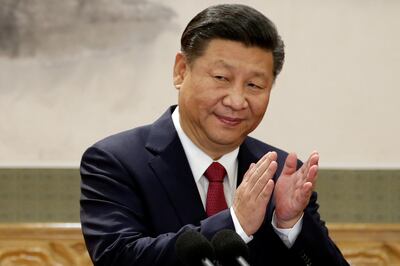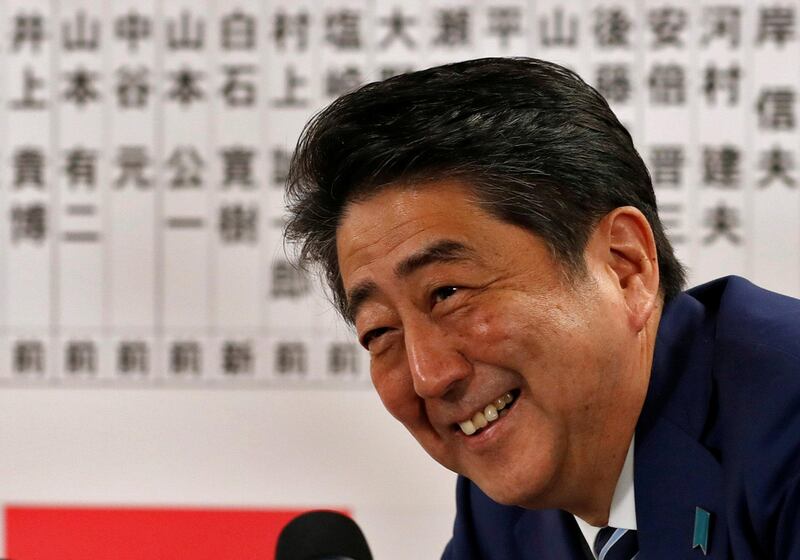East Asia's political leaders are digging in for the long term with Japan's prime minister Shinzo Abe having just won an election that could see him stay in office until 2021 and China's president Xi Jinping set to remain the head of state for at least another five years, or even longer.
This points to coming geo-political realignments and competing economic alliances in the world's fastest-growing region that will impact a wide swathe of other countries stretching across the Eurasian continent and into the Middle East, North Africa and beyond.
Both prime minister Abe and president Xi are ambitious, set on stamping their identity on Asia and on the world. This all but guarantees that competition and a battle for regional and international influence will be key elements of Japanese and Chinese foreign relations.
Already the battle lines of competition are being dawn up in the economic sphere. This became clear immediately after the election success of Mr Abe's Liberal Democratic Party in retaining a two-thirds "super majority" in Japan's main policymaking lower house of parliament.
Japan's minister of foreign affairs Taro Kono announced after the election that Mr Abe would this week propose visiting the US president Donald Trump a strategic dialogue among leaders of the US, India and Australia, aiming at counter-acting China's expansion under its "Belt and Road" policy.
The Abe plan envisages the four nations promoting free trade and defence cooperation across land and sea to South East, south and central Asia, and beyond to the Middle East and Africa, Along with Japan's plan for an Asia-Africa economic link this suggests a competitive response to Mr Xi's One Belt-One Road initiative.

"Japan needs a grand strategy on how to connect with the rest of the world," Masuhiro Kawai, an economics professor at the University of Tokyo and a former senior Japan government official, tells The National. A "Japan-India-Africa corridor" could help to serve this end, Prof Kawai suggests.
Mr Abe's agenda, now that he has secured another three-year term and the prospect of a further term beyond that (which would make him the nation's longest-serving leader in Japan's postwar history) focuses ostensibly on furthering the set of "Abenomics" policies he has pursued since coming to power at the end of 2012.
But the Japanese leader's plan to push national economic growth as a priority is linked to wider geo-strategic and geopolitical ends that will impact Japan's security as well as international trade and investment relations, analysts say.
"Japan’s economy is expected to grow again this year - at 1.3 per cent - thanks to a continued pick-up in trade and temporary fiscal support, according to the IMF's annual report in July. "But a rapidly ageing population and a shrinking workforce mean that the country will need to speed up reforms to boost wages, productivity, and growth," it said in its review of the Japanese economy.
GDP expanded by an annualised 2.5 per cent in the three months ended June 30, said Japan's ministry of finance in June, compared with a preliminary reading of 4 per cent growth and the median estimate of economists of 2.9 per cent.
China overtook Japan several years ago to become the world's second-largest economy behind the US in terms of GDP. However, Mr Abe said after his election victory he will prioritise growth over fiscal reform, as he strives to stay abreast of China's advance and would re-assert Japan's global role.
_________________
Read more:
Cash-loving Japanese savers choose to play it safe
Japanese steel major admits falsifying quality data
With no indigenous fuel sources, Japan is looking to diversify its energy mix
_________________
To some, fiscal "laxity" looks risky given that the government has huge outstanding debt - equal to a record 230 per cent of GDP, estimated at some US$4.93 trillion last year by Trading Economics, and by far the biggest among advanced economies. But Mr Abe shrugs off such fears. "In order to pay back Japan's public debt, you need economic growth," he says.
However, some analysts point to the dominance of huge companies in the country's business landscape. "Japan has become increasingly integrated in global value chains, especially in Asia," says the OECD in its economic forecast report of June. "The benefits of international trade are concentrated in large firms, as few small and medium-sized enterprises export, thus contributing to the large labour productivity gap between large and small firms.
"Although the number of SMEs that export is rising gradually, policies to help SMEs enter international markets would support inclusive growth. Reducing the high level of support to farmers, in part by lowering trade barriers, would also deepen Japan's integration in the world economy," it adds.
Mr Abe has particular reason for pushing economic growth ahead of fiscal austerity. This has to do with his determination to amend Japan's "pacifist" constitution and in order to do this he needs to win broad public support for his controversial aim of changing the constitution.
"It is imperative for 'Team Abe' to remain focused on the creation of pro-growth, pro-business policies," says the vetaran Japan analyst Jesper Koll. "Without a broader feel-good factor amongst the people, constitutional referendum is poised to be defeated," he tells The National.
The constitutional reform Mr Abe is aiming at will allow Japan to acknowledge officially that it has an army, navy and air force rather than "Self Defence Forces" as they have been known in the post Second Word War period. In turn this will enable Japan to project military force overseas.
"For the first time in history,constitutional reform was part of the ruling parties official policy platform and there can be no doubt that [Mr] Abe will use [his] super majority [in parliament] to engage in concrete proceedings to revise Japan's basic law," adds Mr Koll.
Mr Abe proposed in May of last year adding a clause to Article 9 of Japan's postwar "pacifist" constitution to legitimise Japan's Self-Defence Forces (SDF). Taken literally, Article 9 bans a standing military but has been interpreted so as to allow armed forces exclusively for self defence.
The nation's parliament passed laws in 2015 allowing Japan to exercise collective self-defence and to aid allies under attack.This was based on a reinterpretation of the constitution rather than a formal revision. However, critics claim that these laws violate the constitution.
Japan's SDF has given logistical aid overseas to the US military, as in the case of the Second Gulf War in 2003 but while constitutional change enabling Japan to project other types of military assistance overseas win support from the US, China and South Korea, among others, are very cautious.
On trade and investment issues, the re-elected Mr Abe administration will seek to revive the Trans-Pacific Partnership (TPP) agreement among a dozen of the world's leading trading nations after Mr Trump withdrew the US from the agreement as one of his first acts in office this year.
Japan is trying to hold the TPP together as a bulwark against China's economic and security influence, in the hope that the US will return to membership. But Beijing is pushing its own regional accord in the shape of the proposed Regional Comprehensive Economic Partnership (RCEP).
The key issue now for Japan-China relations in the wake of Japan's election and of the National People's Congress in China is whether Mr Abe and Mr Xi will feel confident enough to launch mutual peace initiatives from their strengthened power bases, or step up competition with each other.






